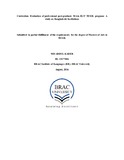Curriculum evaluation of professional post-graduate MA in ELT/ TESOL program: a study on Bangladeshi institutions

View/Open
Date
2016-08Publisher
BRAC UniversityAuthor
Kader, Md. AbdulMetadata
Show full item recordAbstract
This study examines the effectiveness of the ELT/, TESOL curriculum in Bangladesh. More particularly, this provides an overview of the current state of the programs and students feedback on their learning, expectations, and any discrepancies in academic grading through marking scale comparing to public and private university grading system. Also to be singled out, level of expertise of instructors has also appeared to evaluate their acceptability and efficiency in this field along with the cost effectiveness of the programs. However, to conduct this research, researcher has followed mixed-method approach where both qualitative and quantitative data are collected from enrolled or passed out MA in ELT, TESOL students and their instructors from 2 public universities and 3 private universities. Hence, two separate questionnaires for instructors and students are used as tools for data collection following Stufflebeam’s CIPP model of program Evaluation. Finally, this study has illustrated a number of striking findings where it is clearly presented that the current Professional Post-graduate ELT/TESOL programs are moderately fulfilling students’ expectations and job market’s demand. It is also evident that these programs are moderately cost effective in our country. Moreover, most of the instructors involved in teaching do not possess any relevant degree to teach at these programs. Majority are joining from different background like literature. However, there is also a large discrepancy found in the grading scale and curriculum of public and private universities who offer MA in ELT/TESOL program. In fine, the study ends with some important recommendation and suggestions how to develop and sort out any debatable issues form the findings.
Description
This thesis report is submitted in partial fulfillment of the requirements for the degree of Masters of Arts in Teaching to Speakers of Other Languages, 2016.Department
BRAC Institutes of LanguagesType
ThesisCollections
- Thesis (M.A in TESOL) [114]
